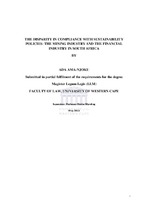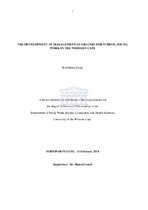| dc.description.abstract | This research project, in which social welfare constitutes the central focus of study, is undertaken within the broad field of development studies. The basic concern of the study is to determine the role and the place of social welfare in a post-apartheid South Africa. The study therefore seeks to produce some of the policy-making knowledge and a framework for formulating alternative social policies. With the emergence of the post-apartheid South Africa, social welfare as a system, and social policy in particular, finds itself at a water-shed. For many years social welfare has been practised on a racially-differentiated basis. Social policies were firmly rooted in the prevailing political ideology of apartheid. During its formal inception in the 193Q's, the primary objective of social welfare was to solve the Poor White problem. Currently we have reached a critical turning point in the history of our country. The establishment of an inclusive democracy should have a direct impact on the welfare of all citizens. In this new context we have to deal with mass poverty - the basic human needs of many South Africans not being met - and extreme inequalities. Meanwhile we are saddled with different models of welfare based on the fragmented social policies of the past. Various themes pertaining to social welfare are examined with the view to proposing some solutions to the dilemma. Theories of development constitute the frame of reference for the analysis and development of alternative social policies. Applying these theoretical foundations, a special study is made of the emergence and structuring of social welfare in South Africa. In an empirical study the views of stakeholders in the field are gathered using qualitative methodology. Theories of development, the Reconstruction and Development Programme, the idea of social welfare as a system to meet human needs, and the views of stakeholders, form the basis for the development of alternative social policies in the post-apartheid South Africa. Using this conceptual framework and analysis of contemporary realities, certain policy proposals are examined for their appropriateness to address post-apartheid challenges. The study demonstrates
that a paradigm shift is absolutely necessary in order to deal with emerging realities in South Africa. This paradigm shift entails that social welfare adopt a developmental approach within an integrated policy framework. | en_US |




